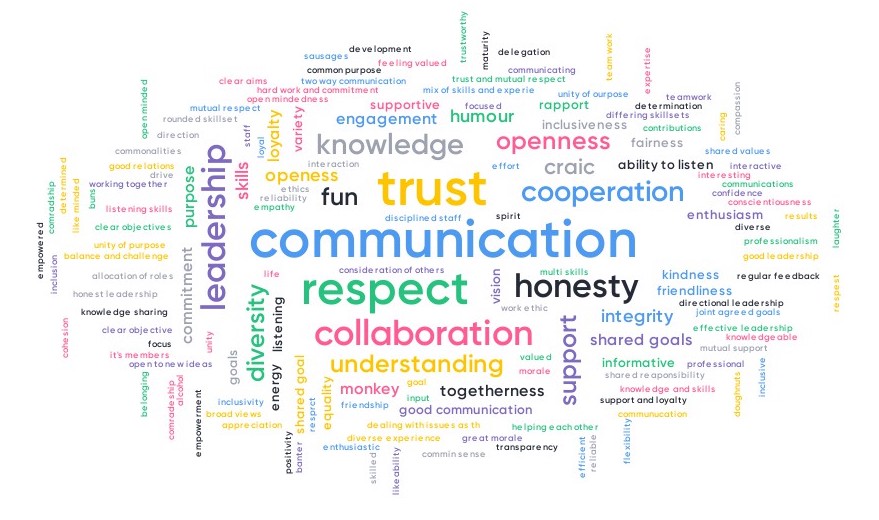by Allan LEONARD for FactCheckNI (15 May 2019)

FactCheckNI is becoming a regular feature of the annual NICS Live event, which brings together figures from across the Northern Ireland Civil Service as well as the wider public, private and voluntary sectors. This year was our third consecutive appearance, and I gave a presentation on “Beyond fake news: Working collaboratively to address misinformation”, discussing some key features of fact checking and the role that facts play in the political sphere of opinions and persuasion.
The session began with an interactive quiz, challenging the 200 or so audience members with half dozen “Fake or Fact” questions. Participants weren’t fooled by the claim that the television series Game of Thrones employs more than the Northern Ireland Civil Service, but they learned that the cameo coffee cup appearance wasn’t from Starbucks!
I explained that a claim is only something that can be verified or debunked. You can neither fact check someone’s opinion nor the future.
There is so much cognitive biases going on in absorbing information all around us. Everyday conversation requires us to accept rather than reject what we hear (language is hard enough to process), so we tend to believe new information that aligns with what we already think to be true (confirmation bias), and we respond to repetition (the persuasion of persistence).
Then there’s the power of group conformity: “This many people can’t be wrong.” Furthermore, dissent within groups is often punished. I described the experiments of sociologist, Robb Willer, where he asked undergraduates students to rank a paper (that they didn’t know was a hoax paper). Individually, most gave it a low grade. But in a group environment, participants tended to agree with a group consensus, which was to give the paper a higher grade; dissenters were sanctioned.
When the experiment was extended to twelve groups of six over a conference call, it also resulted in the group awarding a high consensual grade. I suggested that a similar effect could be found among our own social media accounts of friends and followers.
The Burghers of Calais is a story about how a debunked account of the occupation of the French town of Calais has not detracted from the power of the myth narrative. The medieval story says that in 1347, six Calais citizens prepared to sacrifice themselves at the request of the king of England and under the lead of Eustache de Saint Pierre, the richest man of the city. The six lives were spared by a reprieve from the queen.
After this story was proven untrue, it survived with some contextual reframing. The 19th century sculpture by August Rodin was created to represent a patriotic atmosphere and symbolise resistance against foreign interference. The political aims of the story trumped historical accuracy.
I explained the philosophical work of Hannah Arendt, who reckoned that in the realm of politics, some opinion holders may believe that your factual truths are no more self evident than my opinion, dismissing your testimony as unreliable (even if it is reliable). Also, the desire to belong to a majority (in-group) can induce false testimony – rejecting factual truths about the other (out-group) – in order to maintain the consensus of your in-group.
Before social media, the main publicly available sources of information came from journalists and the multitude of print and broadcast media channels. We wove their stories into a comprehensive meaning for ourselves. Now, the network effect of social media has dramatically increased the number of channels of information, and without the primary filter of journalist as truth teller. Some politicians and opinion makers have seized upon this opportunity as an exercise of power. The concern is that modern political lies become so big that our whole “fabric of reality”, as Arendt would put it, will need to be reassembled.
I attempted to put all of this into an overarching perspective of a theory of truth: data provides facts that give us information; but information includes our own personal experiences and biases; opinions can be based on fact-based information as well as on nothing at all; and your worldview of values and beliefs will be the most difficult attributes to shift.
Here at FactCheckNI, we publish fact-check articles, supply media literacy training, and participate in research projects. Following one recent article, Jim Shannon MP amended his language – perhaps an implicit impact of our work? – by being more specific about who was against the proposed “Backstop” in the House of Commons debates on Brexit (60% of unionists, rather than “the people of Northern Ireland”). Our training includes delivery in local youth groups and in-school environments. And we are part of a European Commission research and development project called Co-Inform, which aims to co-create socio-technical solutions, with citizens, journalists, and policymakers, to address misinformation.
There are 160 active fact-checking projects and organisations globally, tracked by the Duke Reporters Lab, many of which are members of the International Fact-Checking Network (IFCN). FactCheckNI was an early signatory of the IFCN’s Code of Principles, and our status has been verified annually by independent assessors. This has brought collaborative benefits, such as eligibility to participate in Google’s Fact Check Explorer, the FactCheckEU service for the current elections to the EU Parliament, and Facebook’s Third-Party Fact-Checking programme.
I wrapped up the session at NICS by expressing gratitude to our internal, “Brady Bunch” team of support – our Advisory Group made up of professionals across disciplines of education, data sciences, journalism, and community development.

The audience responded to my question of “What makes a great team?” with a variety of words; “communication”, “trust”, “respect”, “honesty”, and “collaboration” were the top results.
During the question and answer session, an audience member challenged a claim made by the head of the civil service, David Stirling, in regards to waiting lists for healthcare treatments. I invited her to forward the claim to us at [email protected] so we could investigate and respond.
Another audience member expressed his frustration at the false equivalency some media outlets give to the topic of climate change – according equal airtime to deniers as much as to the scientists. I expressed my sympathy, in that much journalism is driven by a conflict narrative and drive for viewers’ attention. Yet I gave the example of Wikipedia, where the online, extensively source referenced entry on climate change is overwhelmingly that of scientific evidence, with only a few lines remarking that there are those who deny the testimony. However, the greater challenge of persuading people of the merits of the facts of climate change falls into the realm of the political, and I referenced my previous remarks of Hannah Arendt.
The last remark from the audience was about how one of the roles of the civil service is to hold politicians accountable to the advice that they provide them. He expressed his concern of elected representatives blatantly ignoring such advice and becoming something akin to “post-truth” America. First, I replied that I didn’t believe we lived in a post-truth world; facts still matter: “If they didn’t, I wouldn’t be allowed onto this stage!” Second, I opined that I was confident that the American society will withstand the excesses of “fake news” antagonism to the press – freedom of speech and the position of the press as the “fourth estate” in America’s political system of checks and balances is well established. It’s the export of hostility to the press in other, less resilient democracies that gives me most cause for concern; I cited Philippines and Turkey in particular.
I concluded by underlining the crucial role that a professional civil service has in ensuring that facts matter. Once this source of primary information gets corrupted or compromised, then the risk to democracy is greater. It’s vital to protect this dimension of our political reality, in encouraging fact-based narratives.




